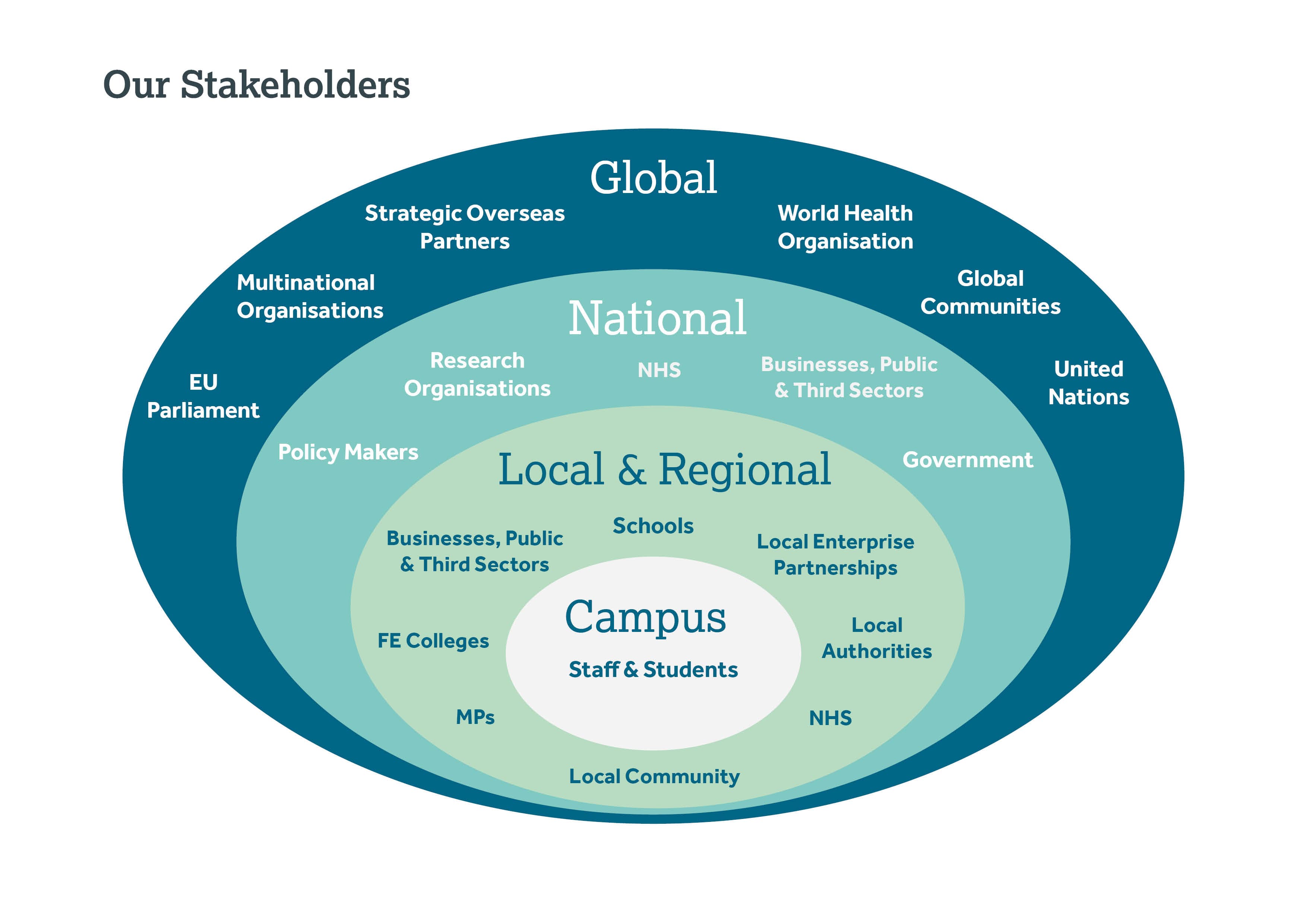
Engagement at Lancaster University
Engagement is central to Lancaster University’s 2021-26 Strategic Plan, which sets out our vision to deliver the highest quality research, teaching and student experience; and to engage locally, nationally and internationally, using our collective capabilities as a force for good.
Engagement at Lancaster is defined as:
‘Building collaborative, sustainable relationships with partners and communities for mutual benefit to create positive economic, cultural, societal and environmental change through research, teaching and institutional activities.’
Engagement is also embedded in the University’s Values:
- We respect each other by being open and fair and promoting diversity
- We build strong communities by working effectively together in a supportive way
- We create positive change by being ambitious in our learning, expertise and action
The Pro-Vice-Chancellor Engagement (PVC-E) and Associate Dean for Enterprise and Engagement formally lead institutional engagement,supported by Faculty Associate Deans and engagement leads from academic departments. The Engagement Advisory Group oversees and advises on the University’s engagement strategy.
Engagement, strategy and values
This video shows how central engagement is to the Lancaster University strategy, what it means to us and why it is important.

Engagement, research and teaching
Engagement and the two other strategic priorities of research and teaching are interrelated and complement each other, for example:
If an academic is working with a business, this can provide real-life examples that can make teaching more relevant to their students. It could lead to a student placement as well as helping both the business and the University to grow.
A researcher may be asked to speak at a practitioner event about their research (a form of engagement). Following from this, a senior NHS manager asks the academic to work on a project applying their research into clinical settings, and subsequently, changes are made to national clinical guidelines to improve quality of care (generating impact).
Dan Prince, Professor of Cyber Security encourages all academics to build up an engagement portfolio. He talks about how engagement can increase research impact - informing policy debate, business ideas and increasing public understanding. His network of external practitioners have been transformational to the student experience, through them sharing their real-life experience and challenges.
Why engage?
There are many reasons for carrying out engagement activities. Here are some:

Societal benefits
Using the University’s intellectual and wider capabilities to co-create a better society. Acting as a ‘force for good’ and for transformative economic and societal benefit.

Excellence in research
Engagement can improve research quality, and be a pathway to impact. The Research Excellence Framework (REF) measures the reach and significance of impact that emerges from research and engagement.

Enhance teaching
Real world context can make teaching more relevant and stimulating. It can lead to better student outcomes by highlighting career options and improving employability.

Share and inspire
This can include activities such as outreach in schools, exhibitions, festivals and public lectures. What could be better than sharing research to inspire others?

Growth opportunities
Engagement may lead to income generation through consultancy, knowledge transfer partnerships, research contracts and commercialisation. This can support the growth of the University and its partners.

Enhance your career
Engaging can develop your transferable skills. For academics and researchers, engagement is a strand of the academic promotion criteria.
This video has been put together by the Faculty of Social Sciences (FASS) and illustrates the benefits of carrying out engagement activities to researchers and to those they are engaging with. The term knowledge exchange is used in the video. Engagement and knowledge exchange are often terms used interchangeably. Knowledge exchange in the Knowledge Exchange Framework (KEF) has a more defined meaning, determined by the KEF metrics.
Types of engagement activity
Engagement activity can be put together by type. This helps to make sense of the myriad of activities taking place.
Whilst the different types are presented as discrete, in reality they link and interrelate.
Business engagement
We work with businesses and other organisations, from start-ups and charities to multi-national corporations, through consultancy, research contracts, Knowledge Transfer Partnerships, commercialisation, and student placements.
An example is research into Company Financial Reports by Professor Steve Young which has led to consultancy with organisations such as the Financial Conduct Authority (FCA), Pensions and Lifetime Savings Association (PSLA) and the Railway Pension Scheme. Steve has put together a talking head video to explain his work and the impact of his engagement activities.
Similar opportunities may arise in the Public and Third Sector.
More information on working with businesses

Policy engagement
This can contribute to local, national or international decision-making processes and policies. We can provide new ideas and thinking that makes a positive difference to society.
Dr Temidayo Eseonu works with local and regional policymakers to get the voices of racial minority communities into policy making and has established the Racial Equity Policy Network. Watch Temidayo's talking head video, in which she explains her work and shares top tips.
Professor Nancy Preston is an expert in supportive and palliative care at Lancaster University where she is a Co-Director at the International Observatory on End-of-Life Care. She was asked to give evidence before a Parliamentary inquiry into assisted dying and assisted suicide. Watch Nancy's talking head video, in which she explains the importance to her of working with policymakers.
More information on working with policymakersPublic and community engagement
We work with the public to help shape, carry out and share our research.
Learning from communities to inform our research, involving the public in research, and igniting curiosity through events and workshops.
Here are some examples of Public and Community Engagement:
Researchers visiting a local primary school to teach children about the use of Artificial Intelligence (AI).
Babylab is an example of public involvement in research, where babies and young children help to answer important research questions such as: How do babies master language? How do they learn to understand the world around them?
Bright Club-a unique form of public engagement where researchers distil their ideas into a short comedy set in a public venue in Lancaster.
More information on working with the public and communities

Media engagement
This can be a great way of raising the profile of your research and that of the wider university to a wide, general audience. It can be a fantastic opportunity to share the findings of new research or help inform the public about key issues playing out in the news. Engagement with the media can be varied and involve different approaches – from appearances on local radio to TV interviews, written blogs, social media posts etc.
Professor Hilary Ingham from the Economics department has worked closely with the university’s press office to build up a significant media profile over recent years. She is a labour market expert and has given many interviews to help the public understand and navigate various crises such as ongoing industrial action, the cost of living crisis and the rising cost of energy. She has been interviewed by regional, national and international media and is a regular commentator on prominent channels, having secured several appearances on BBC Breakfast, BBC Radio 5 Live and BBC Radio 4’s Today programme. Watch Hilary's talking head video for more information. Visit the Press Office webpages for support with media engagement.
To stay up to date on media engagement follow the press team on Twitter (X): @LancasterPress and visit the press news pages.
More information on working with the mediaCivic and cultural engagement
These are activities that enrich society at the local, regional, national or global level.
Eden Project Morecambe is a good example. Lancaster University is a founding partner. This large-scale regeneration project will bring visitors and jobs into the locality and boost local businesses. It aims to regenerate Morecambe into a coastal resort for the 21st Century.
Morecambe Bay Curriculum (MBC) is a project that was inspired by Eden Project Morecambe. The curriculum aims to ensure that the different stages of the education system provide the green skills, knowledge and behaviours required by industry to respond to the climate emergency. One initiative that is part of the MBC is one in which local school children select their own local environmental project to research. For more information read the Little Researchers case study.

.jpg)
Campus engagement
Campus Engagement – this includes initiatives that enhance and support student, staff and alumni experiences on all of Lancaster University’s campuses.
Global Classrooms is an example of campus engagement. Led by Professor Yang Hu from the Sociology department at the Bailrigg campus, this project supports the enablement of Global classrooms.
These virtual classrooms connect physical classroom spaces in real-time via digital live streaming technologies across multiple international partner universities and Lancaster campuses, including Ghana, Leipzig, BJTU (Weihai), and Sunway University. Global Classrooms provide a new low-carbon model of global teaching, learning, and engagement. Colleagues across Lancaster’s international campuses and partner institutions co-design and co-deliver the Global Classroom modules. Students participating in the Global Classrooms engage in global interactive learning and conduct group projects to tackle global challenges ranging from the global climate emergency and food insecurity to intersectional racial inequalities.
Who do we engage with?
We engage with a huge number of partners and people. Here are some of the main ones:

Accordion
-
Our stakeholders, accessible text
Global
- EU Parliament
- Multinational organisations
- Strategic overseas partners
- World Health Organisation
- Global communities
- United Nation
National
- Policymakers
- Research organisations
- NHS
- Business, public and third sectors
- UK Government
Local and Regional
- Members of parliament
- Further education colleges
- Business, public and third sectors
- Schools
- Local enterprise partnerships
- Local authorities
- NHS
- Local community
Campus
-
Staff and Students
Engagement and frameworks
Engagement has its own framework in the Higher Education sector - the Knowledge Exchange Framework (KEF). The Knowledge Exchange Concordat works alongside the KEF. Engagement is also featured in the Research Excellence Framework (REF) and can influence the quality of teaching as measured in the Teaching Excellence Framework (TEF).
-
Knowledge Exchange Framework (KEF)
The KEF provides a range of information on the knowledge exchange activities of higher education providers.

-
Knowledge Exchange Concordat
The KE Concordat recognises, develops and improves the many different ways higher education providers engage in knowledge exchange.

-
Research Excellence Framework (REF)
The REF is the system for assessing the excellence of research in higher education providers.

-
Teaching Excellence Framework (TEF)
The TEF encourages and recognises high-quality teaching and student outcomes in higher education.




.JPG)

.png)